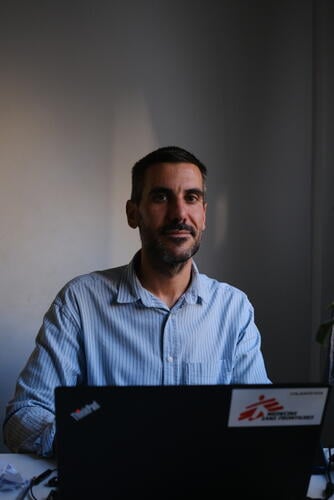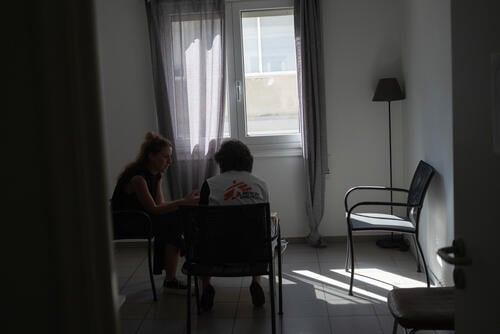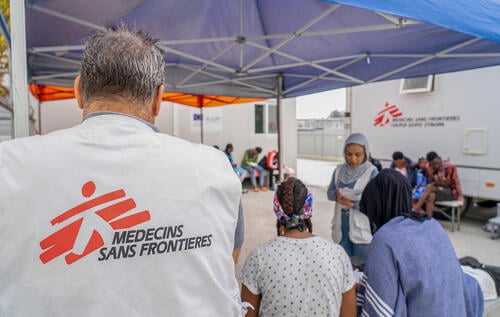“It's difficult for many of them, because they have to prove their vulnerability in legal terms. It's emotionally dehumanizing that I need to prove what has happened to me for a basic human right, which is safety.”
With these words, Panos Mylonas, a psychologist and mental health activity manager working with Médecins Sans Frontières (MSF) in Athens, Greece, describes the emotional toll that the asylum-seeking process takes on individuals who are forced to continually justify their suffering.
On International Mental Health Day, in a conversation with Panos, the depth of the mental health crisis among migrants and refugees becomes painfully clear. Having worked with MSF for over four years, Panos shared his experiences working in the grave migration reality in Athens, where he supports unaccompanied minors, victims of sexual violence, and people with psychiatric needs.
They come here, having faced traumatic events in their country of origin and during their journey, which leads to very complex mental health presentations.Panos Mylonas, a psychologist and mental health activity manager
The journey, the future, and the trauma
Migrants and refugees arrive in Greece carrying stories of survival from their countries of origin. Many of them have faced life-threatening circumstances including violence, torture, imprisonment, and sexual violence. Panos describes how most individuals are unaware of the dangers they will face on their journey, which often includes additional trauma. He explains that the combination of their traumatic experiences at home and the violence they encounter while fleeing leads to complex mental health issues that emerge when they arrive in Greece.
“They come here, having faced traumatic events in their country of origin and during their journey, which leads to very complex mental health presentations,” says Panos.
Panos highlights several recurrent mental health issues among the migrants he works with, including suicidal ideation, hopelessness, and severe anxiety.
“Almost all of them talk about suicidal thoughts, lack of support, and sleeping problems,” he says. The overwhelming feeling of hopelessness stems from their uncertain future in Greece, where many remain in a state of limbo, waiting for their asylum claims to be processed. This uncertainty exacerbates their trauma, preventing them from finding any sense of stability.

One of the most severe challenges faced by migrants and refugees is the deprivation of access to healthcare, which has a direct and devastating impact on their mental health. Panos explains that “when they get, let's say, a negative reply to their asylum claim, this means that their access to healthcare is stopped.”
For many, this loss of healthcare is a significant blow, exacerbating their feelings of helplessness and deepening their mental health struggles. The denial of essential medical services strips them of the opportunity to receive both physical and psychological care, worsening their already fragile state. Panos places great stress on the need for uninterrupted access to healthcare, regardless of asylum outcomes, asserting, “access to healthcare should always be present, regardless of the result.” Without such support, the psychological burden on these individuals intensifies, leaving them trapped in a cycle of uncertainty and despair, further complicating their ability to rebuild their lives.
A particularly vulnerable group
Among the most vulnerable are unaccompanied minors, who face specific challenges. These young individuals, already in a fragile stage of their development, are thrust into an environment where they are disconnected from their families and have limited social support. While Greece provides some legal protections and shelter, Panos explains that these minors often face a sudden withdrawal of support once they turn 18.
“Once they are no longer minors, they are sent to camps, where there is little to no follow-up,” he adds, explaining the difficult transition many minors face as they enter adulthood without sufficient support.
The scope of MSF is limited, and the needs are much greater than we can meet.Panos Mylonas, a psychologist and Mental Health activity manager
MSF provides crucial support
MSF plays a crucial role in providing specialised mental health support to refugees and migrants. MSF offers a space where individuals are welcomed with respect and dignity.
“We provide them a space, regardless of race or gender or sexuality, to be heard and supported,” he emphasizes. We not only offer psychological support but also works in collaboration with social workers to provide holistic care, addressing both the practical and emotional needs of the migrants.
However, the demand far exceeds the capacity of MSF. Many patients have complex mental health needs, requiring long-term support that is difficult to sustain. “The scope of MSF is limited, and the needs are much greater than we can meet,” says Panos. This underscores the need for more comprehensive support systems for migrants, including better integration strategies and expanded mental health services.
When asked what he would change in the current system, Panos calls for faster processing of asylum claims and better living conditions in the camps, which often feel like prisons to those forced to reside there. He also points to the need for greater community support and raising awareness in the host society.
“There needs to be more awareness in Greek society about what is happening and more efforts to integrate these individuals into the community,” he suggests. Improving the availability of interpreters in healthcare settings and ensuring continuous access to healthcare, even for those who receive negative asylum claims, are also critical changes MSF calls for.
Médecins Sans Frontières has been providing essential medical and humanitarian aid to asylum seekers, refugees, and migrants in Greece since 1996. In response to the 2015 humanitarian crisis, MSF expanded its efforts to address the growing needs of people arriving in Greece. Emergency interventions were set up across Lesvos, Samos, Chios, Athens, and the border town of Idomeni, offering medical and mental health care, shelter, water and sanitation services, and distributing vital relief items. From December 2015 to March 2016, MSF also carried out life-saving search and rescue operations in the Aegean Sea.
Since the beginning of 2024, our mental health services in Athens, Greece have provided vital support to more than 1,900 individuals. Our primary clinical diagnoses include anxiety disorders, PTSD, and depression, often triggered by difficult living conditions, forced displacement, and experiences of sexual violence. Over half of those we support (56.3%) have been impacted by violence, leading to symptoms such as anxiety (40.9%), depression (31,6%) and trauma-related distress (14,7%). Our team works to address these complex needs, helping people cope with the challenges of displacement and adversity.






